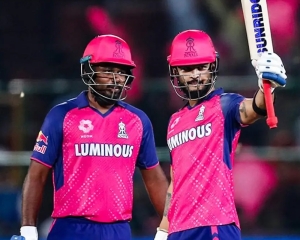Himachal Pradesh Chief Minister Sukhvinder Singh Sukhu on Sunday launched two significant initiatives in the education sector, marking a pivotal moment for the state’s educational landscape. These initiatives include the distribution of tablets to primary school teachers and the introduction of ‘Mukhyamantri Bal Poshtik Aahar Yojana’ — both aimed at enhancing the quality of education and improving nutritional standards for students in government schools.
Under the tablet distribution initiative, 17,510 primary school teachers across the hill state will receive tablets. The move is part of the government’s broader push towards digitization, which aims to modernize teaching methods, provide easy access to digital resources, and streamline administrative processes such as attendance tracking and data management.
By equipping teachers with these digital tools, the State Government hopes to significantly improve the overall quality of education, enabling teachers to present educational content more effectively and participate in online training programs that will further their professional development.
Simultaneously, the Chief Minister also launched the ‘Mukhyamantri Bal Poshtik Aahar Yojana’, a nutritional scheme designed to complement the existing Mid-Day Meal Scheme. This initiative targets students from Nursery to Class VIII across 15,181 government schools, aiming to provide additional nutrition to about 5,34,293 children.
Under this scheme, students will receive boiled eggs or fresh fruits once a week, sourced from local markets based on the preferences of the children. The State Government has allocated an additional budget of Rs 12.75 crore for the scheme for the current financial year, emphasizing its commitment to improving child nutrition and overall health.
During the launch event, the Chief Minister addressed the decline in the state's ranking in terms of educational quality, which slipped to 18th place under the previous BJP Government. He highlighted that the current administration is making concerted efforts to reverse this trend. The Chief Minister outlined a three-pronged approach to improving education: ensuring no shortage of funds for quality education, sending teachers abroad for exposure visits, and establishing Rajiv Gandhi Day-Boarding Schools in every assembly constituency to strengthen educational infrastructure.
In the first phase, 217 teachers have already been sent to Singapore for training, reflecting the Government's focus on enhancing the skills and global exposure of educators.
The Chief Minister also announced a new policy for teacher transfers, limiting them to once a year to ensure stability in schools and continuous quality education for students. He criticized the previous government for opening over 400 educational institutions without adequate staffing, leading to a decline in educational standards. To address this, schools with fewer than five students are being merged with nearby institutions, and if necessary, the government will provide transportation support for students, even allocating up to Rs 20,000 for this purpose.
The Chief Minister also mentioned that colleges in the State would undergo rationalization to ensure the provision of quality education.
Also touching upon the broader economic challenges facing the State, particularly the rising debt burden exacerbated by previous administrations, Sukhu criticized the past Government's populist measures, such as waiving electricity and water bills for affluent families, which he said contributed to the state’s financial woes.
Despite these challenges, the current government has provided a seven percent Dearness Allowance (DA) to employees and has committed to paying arrears to over 28,000 pensioners aged 75 and above this year. The Chief Minister urged the government employees to support the State's efforts to recover Rs 9,000 crore of NPS funds stuck with the Central Government, highlighting the government's dedication to restoring the state's economy within the next six months.
In addition to these initiatives, the State Government is upgrading 850 educational institutions to Centres of Excellence and has adopted 6,000 orphaned children as ‘Children of the State’ under the Mukhyamantri Sukh Ashray Yojana. This scheme ensured their education, care, and support until the age of 27. Furthermore, a Centre of Excellence is being established in Kandaghat, Solan district, to provide specialized education for around 300 specially-abled children, enabling them to pursue higher education. The government has also implemented the Cluster System in schools, grouping institutions within a 500-meter radius to optimize resource use, and introduced New Age Courses in educational institutions to meet market demands, including Artificial Intelligence, Data Learning, Electric Vehicle Mechanics, and Internet of Things (IoT) Technician training.
Education Minister Rohit Thakur, who was also present at the event, emphasized the state’s progress in education, with Hamirpur district leading the charge. He reiterated the Government's commitment to providing quality education and praised the Chief Minister for his tough but necessary decisions that would yield positive results in the future.























